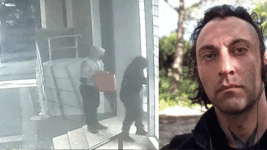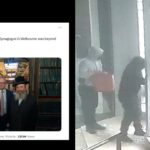The Great “Antisemitism Crimewave” Was Not Motivated by Prejudice Towards Jews

A 21-year-old man involved in anti-Israel vandalism on Gadigal land in Sydney’s eastern suburbs in November 2024, has been sentenced to an 11 month intensive correction order (ICO), in respect of a spree that involved graffiti, the damaging of ten cars and the torching of one vehicle, and Sutherland Local Court heard on 25 November 2025, that he wasn’t motivated by antisemitism.
The court instead found that Thomas Stojanovski had been paid $1,000 to carry out the crimes by co-accused Mohammed Farhat, who’s been sentenced to 20 months prison. But while the court heard that these crimes were orchestrated to make the local Jewish community fearful, there’s doubt as to whether these men were motivated by antisemitism and nor was their proof Farhat wasn’t directed.
The reason why the motivation of these men was queried in court is that over two dozen people have been charged in relation to a crime spree in Greater Sydney last summer, which, despite being commonly dubbed “the antisemitic crimewave”, has been found to involve gig criminals who don’t harbour any ideological motivations, including antisemitism, being paid to commit these crimes.
The AFP and NSW police revealed at a 10 March 2025 press conference that the major incidents that took place over October 2024 to early February 2025 had been orchestrated by a local organised crime figure then overseas, who sought to convey a wave of hate crimes, which he could then tipoff police in regard to in exchange for easier penalisation relating to his own unrelated criminal matter.
The so-called ‘antisemitic crimewave’ took place at least six months into a local moral panic around a suggested rise in antisemitism, or prejudice against Jewish people. And ever since federal and state law enforcement revealed their findings, each piece of new evidence serves to further dispel ideas that the crimes were motivated by hate. However, the spectre of widespread antisemitism remains.
“A criminal con job”
“Including today’s activities Strike Force Pearl has charged 29 individuals for a total of 127 charges,” said NSW police deputy commissioner Dave Hudson at the 10 March press conference, where it was revealed that the so-called antisemitic crimes had been “orchestrated by an organised crime element and conducted to further their own causes.”
Strike Force Pearl was the NSW police investigation into antisemitism launched in December 2024. Operation Kitchner was the Australian federal police operation focused on so-called antisemitic crimes, and it came to the same conclusion. NSW police had executed 11 search warrants in Greater Sydney earlier that same day, and 14 people were subsequently charged.
“None of the individuals that we have investigated during Pearl have displayed any form of antisemitic ideology, however the threat to the community through the use of arson and the presence of explosives was very real,” Hudson made certain. “I understand the angst these incidents have had on the Jewish community, who we have been in constant contact with.”
These comments from Hudson have remained the definitive statement on the motivations of the antisemitic crimewave not being spurred by prejudice towards Jewish people.
Numerous reports on the outcomes of further criminal investigations by law enforcement in respect of these crimes in Sydney and as well, Naarm-Melbourne, have continued to shine doubt on this motivation.
The result of mental illness
The headline in Israel’s oldest paper on Monday read Australian Judge Rules Synagogue Arsonist Motivated by Mental Illness, Not Antisemitism, which again is a case in point. This refers to the arson attack that involved a 35-year-old homeless man from Sydney, Angelo Loras, dousing the front doors of an East Melbourne synagogue with flammable liquid and setting it alight on 4 July this year.
As the attack targeted a Jewish place of worship, it was difficult not to assume that the motivation behind it was antisemitism, especially as the moral panic around it suggested a spike in this prejudice was in full swing, and the increasingly dispelled motivations behind the summer of 2024-25 crimewave remained largely unknown by the broader public not following these developments.
The media had a field day with the 4 July incident, especially as it was accompanied by an anti-Zionist rally out the front of Melbourne Israeli restaurant Miznon, and together these incidents served to further propel the antisemitic moral panic to new heights that made antisemitism envoy Jillian Segal’s 10 July release of her plan to combat Jewish hatred all the more vital.
The Israeli newspaper has reported that Victorian Magistrate Malcolm Thomas found that Loras was not motivated by antisemitism and he, therefore, had not committed a hate crime, despite the fact that numerous politicians, including PM Anthony Albanese, had lined up to label it such a crime in its wake. Loras, according to the court, had been in the grips of a terrifying schizophrenic delusion.
These ongoing determinations of antisemitic crimes before any official outcome of law enforcement investigations have been another key force in keeping the concept of an antisemitic crimewave alive.
Loras was sentenced to four months prison time, which is less than the 138 days he’d already spent in solitary confinement, and he’s been placed on a community correction order (CCO) that requires him to undergo medical treatment.
Israeli intelligence
ASIO director general Mike Burgess announced that his agency had received intelligence suggesting that Iran’s Islamic Revolutionary Guard Corps had orchestrated two of the 2024-25 summer of antisemitism offences. The Israeli press then suggested that Mossad, Israeli intelligence, was the likely source of this intel, which caused PM Albanese to expel the Iranian ambassador.
Burgess explained that the intelligence ASIO had received suggested that the 6 December 2024 arson attack against the Addas Israel Synagogue of Melbourne and the 20 October 2024 firebombing of Lewis’ Continental Kitchen in Bondi were the work of Iranian actors, who organised the crimes via “a layer cake of cut-outs between IRGC and the person or the alleged perpetrators conducting crimes”.
However, circumstances surrounding these incidents suggest otherwise. The actors who burnt down the Bondi deli, accidentally torched the nearby Curly Lewis Brewery three nights prior by mistake, while the vehicle used in the synagogue attack was a “communal crime car” that was also involved in an unrelated shooting and another arson attack on a nightclub.
Questions put to the NSW police minister Yasmin Catley in parliament were answered on 23 October 2025, and they revealed that according to the NSW Police Force, in respect of the 14 major antisemitic incidents investigated by Pearl, it had no evidence of Iranian involvement, or any foreign interference, whilst the 13 property crime incidents were orchestrated by local organised crime.
The civil society commentators and observers who’ve been vocally conveying their doubts over the antisemitic motivations behind the wave of crime, considered that the offences were being construed as Jewish hate crimes in order to deflect from Israel’s perpetration of a full-scale genocide against the Palestinians of Gaza.
Antisemitism is motivated by prejudice towards Jewish people. Anti-Zionism is a stance taken against the political doctrine of Zionism, which promotes the establishment of Israel on the lands of the Palestinians. The understanding was that the initial crimes, at least, appeared to be motivated by anti-Zionism and anti-Israeli sentiment, as the first crimes clearly stated in graffiti “Fuck Israel”.
The common wisdom is that Israeli state actors started to blur the lines between antisemitism and anti-Zionism in the 1970s, in order to deflect from Israeli settler colonial human rights abuses, as criticism of Israel is blocked on the basis that it is falsely conflated with the same dehumanising antisemitism that underpinned the Nazi holocaust against European Jewish people in World War II.
So, casting the crimewave of last summer as antisemitic in nature has served to deflect from criticism of Israel that the earliest crimes were staged to reflect.
But as law enforcement and the courts have found, the perpetrators of these crimes weren’t motivated by any ideology – not antisemitism or anti-Zionism – but rather, they were directed by organised crime, which paid these individuals to commit the offences.







